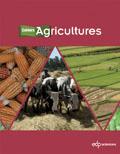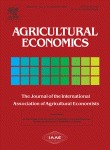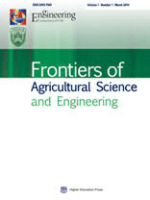
China Agricultural Economic Review
Scope & Guideline
Elevating Academic Discourse in Agricultural Sciences
Introduction
Aims and Scopes
- Agricultural Policy Analysis:
The journal explores the implications of various agricultural policies on productivity, sustainability, and rural development, assessing their effectiveness and impact on different stakeholders. - Sustainable Agriculture and Climate Change:
Research frequently addresses the challenges posed by climate change to agriculture, emphasizing strategies for sustainable practices and resilience in farming systems. - Socio-Economic Impacts on Agriculture:
The journal examines how socio-economic factors, such as education, gender, and urbanization, influence agricultural productivity and rural livelihoods. - Technological Innovations in Agriculture:
There’s a strong focus on the role of digital technologies and innovations, such as e-commerce and smart farming, in enhancing agricultural efficiency and farmer income. - Food Security and Nutrition:
The journal contributes to discussions on food security, nutrition, and health outcomes related to agricultural practices, particularly in the context of rural communities. - Market Dynamics and Trade:
Research includes analyses of agricultural trade patterns, market dynamics, and their effects on domestic and international agricultural sectors. - Risk Management and Resilience:
The journal also addresses risk management strategies in agriculture, including the economic impacts of disasters and the resilience of agricultural systems.
Trending and Emerging
- Digital Agriculture and E-Commerce:
Research on digital technologies and e-commerce platforms is rapidly increasing, highlighting their role in enhancing agricultural productivity and market access for farmers. - Climate Resilience in Agriculture:
There is a growing emphasis on climate resilience, with studies focusing on adaptive strategies for farmers facing extreme weather and climate-related challenges. - Sustainable Development Goals (SDGs) and Agriculture:
The alignment of agricultural practices with the Sustainable Development Goals is an emerging theme, reflecting a broader commitment to sustainability within agricultural research. - Consumer Behavior and Food Safety:
Increasing attention is being paid to consumer behavior, particularly regarding food safety, nutrition, and the willingness to pay for quality and sustainable products. - Interdisciplinary Approaches to Agricultural Economics:
The integration of interdisciplinary methods, including machine learning and big data analytics, in agricultural economics research is on the rise, enhancing the depth and breadth of analyses. - Impact of Global Events on Agriculture:
Studies assessing the implications of global events, such as the COVID-19 pandemic and geopolitical tensions, on agricultural trade and food security are increasingly prevalent.
Declining or Waning
- Traditional Agricultural Practices:
There has been a noticeable reduction in studies related to traditional farming practices, possibly due to the increasing focus on modern, technology-driven approaches to agriculture. - Rural Labor Migration Studies:
Research specifically focusing on rural labor migration and its impact on agricultural productivity has decreased, as the emphasis shifts toward broader socio-economic factors affecting rural areas. - General Economic Theories without Agricultural Focus:
Papers applying general economic theories without direct relevance to agriculture have become less frequent, indicating a move towards more specialized and applied research. - Historical Agricultural Studies:
There appears to be a waning interest in historical analyses of agriculture, as contemporary issues and future-oriented research gain more traction. - Conventional Agricultural Inputs:
Studies centered on the use of conventional agricultural inputs, such as chemical fertilizers and pesticides, are declining in favor of research on organic and sustainable alternatives.
Similar Journals

NJAS-Impact in Agricultural and Life Sciences
Exploring interdisciplinary research for a greener future.NJAS-Impact in Agricultural and Life Sciences is a pivotal open-access journal, published by Taylor & Francis Ltd, focusing on the interdisciplinary nexus between agricultural practices and life sciences. Anchored in the United Kingdom, this journal aims to provide a comprehensive platform for the dissemination of innovative research that addresses critical challenges in environmental sustainability, agricultural productivity, and biological advancements. With its inaugural issue dated from 2023 to 2024, NJAS prominently features the latest empirical studies, reviews, and theoretical contributions that enrich existing knowledge and provoke thought among researchers and practitioners alike. Although currently ranking within the lower percentiles across various Scopus categories, the journal aspires to establish itself as a significant contributor to the dialogue on agricultural and environmental sciences. As scholars in these fields seek to bridge the gaps in understanding, NJAS invites submission from diverse perspectives, underscoring the importance of collaborative knowledge-building in addressing the complexities of our changing global landscape.

African Journal of Agricultural and Resource Economics-AFJARE
Fostering dialogue on Africa's agricultural future.African Journal of Agricultural and Resource Economics (AFJARE) is a dynamic publication dedicated to advancing the fields of agricultural and resource economics within the context of Africa. Published by the African Association of Agricultural Economists, this journal serves as a vital platform for researchers, professionals, and students to disseminate their findings and engage with contemporary issues affecting the agricultural sector across the continent. With an ISSN of 1993-3738 and an E-ISSN of 1993-3738, AFJARE aims to reach a wide audience through its commitment to open access, ensuring that crucial research is accessible to all. The journal has recently established itself in the academic landscape, achieving a Q3 ranking in Agricultural and Biological Sciences and a Q4 ranking in Economics and Econometrics for 2023. Covering a diverse scope from 2018 to 2023, AFJARE encourages submissions that explore innovative economic strategies and policies that can foster agricultural development and resource management in Africa. With its growing impact and relevance, AFJARE is poised to become a cornerstone in the discourse on agricultural economics in Africa and beyond.

CAHIERS AGRICULTURES
Exploring the future of agronomy and animal sciences.CAHIERS AGRICULTURES is a distinguished open-access journal published by EDP Sciences S A, focusing on the vital fields of Agronomy and Crop Science, Animal Science and Zoology, as well as Management, Monitoring, Policy, and Law. With an ISSN of 1166-7699 and an E-ISSN of 1777-5949, this journal has notably maintained a strong presence in the academic landscape since its establishment, covering a wide range of topics pertinent to agricultural sciences. Based in France, CAHIERS AGRICULTURES fosters collaboration and knowledge sharing among researchers and practitioners through its open-access model, which has been in effect since 2014. The journal is recognized for its rigorous peer-review process, reflected in its competitive Scopus rankings, which place it in the Q2 quartile for both Agronomy and Crop Science, and Animal Science and Zoology. Researchers and scholars are encouraged to contribute cutting-edge findings that may influence agricultural practices and policy development. With a vision to advance sustainable agricultural practices, CAHIERS AGRICULTURES stands as a critical resource for advancing scientific knowledge and informing stakeholders in the agricultural sector.

Advances in Agriculture
Empowering Agriculture Through Innovative ResearchAdvances in Agriculture is a prominent Open Access journal dedicated to the dissemination of high-quality research in the fields of agriculture, agronomy, animal science, food science, and soil science. Published by HINDAWI LTD from the United Kingdom, this journal has made significant strides since its inception in 2014, contributing to the advancement of agricultural knowledge and practices. With an impressive impact factor reflected in its tiered quartile rankings, notably Q2 in Agricultural and Biological Sciences (miscellaneous), Agronomy and Crop Science, and Animal Science and Zoology, it serves as a key platform for innovative research and applied science. The journal aims to provide researchers, professionals, and students with rich access to groundbreaking studies that can help shape sustainable agricultural practices and policies. Emphasizing a global audience, Advances in Agriculture promotes an inclusive dialogue among scholars to tackle contemporary challenges in agriculture, enhancing food security and environmental stewardship worldwide.

AGRICULTURAL ECONOMICS
Advancing agricultural insights for a sustainable future.AGRICULTURAL ECONOMICS, published by Wiley, is a premier journal dedicated to advancing the understanding of agricultural economics, with an ISSN of 0169-5150 and an E-ISSN of 1574-0862. This esteemed publication serves as a vital resource for researchers, professionals, and students in the fields of Agronomy and Crop Science, as well as Economics and Econometrics, consistently reflecting its high standing as evidenced by its 2023 Q1 ranking in both categories. With a comprehensive scope spanning from 1986 to 2024, the journal presents rigorous analysis and innovative research that informs policy decisions and enhances agricultural practices globally. Although it does not provide open access options, the rich academic content invites a dedicated readership committed to strengthening the agricultural sector through evidence-based insights. The journal is particularly noted for its impressive Scopus rankings, placing it among the top-tier resources for understanding the complex interplay between economic theory and agricultural development.

Food Security
Transforming Knowledge into Action for Food SecurityFood Security is a premier academic journal dedicated to advancing knowledge and fostering dialogue surrounding the critical issues of food security and sustainability in a rapidly changing world. Published by Springer, this journal has established itself as a leading voice in the fields of Agronomy, Crop Science, Development, and Food Science, reflected in its impressive Q1 quartile rankings across these disciplines for 2023. With an impact factor showcasing its significant influence, Food Security is ranked in the top echelon of its domain, with notable positions in Scopus indices (Rank #7 in Agronomy and Crop Science, Rank #6 in Development, and Rank #13 in Food Science). Spanning articles from 2010 to 2024, the journal serves as a critical resource for researchers, professionals, and students seeking to address the complex interplay of agricultural practices, socio-economic dynamics, and environmental factors that contribute to food availability and accessibility on a global scale. While primarily subscription-based, Food Security ensures that its audience remains engaged with the latest research, policy discussions, and innovative solutions to combat food insecurity worldwide.

Frontiers of Agricultural Science and Engineering
Pioneering research at the forefront of agricultural sciences.Frontiers of Agricultural Science and Engineering, published by HIGHER EDUCATION PRESS, is a distinguished open-access journal established in 2014, dedicated to advancing research across the fields of agricultural and biological sciences, biotechnology, and veterinary studies. With an impressive Q1 ranking in both Agricultural and Biological Sciences and Veterinary categories for 2023, this journal positions itself prominently within the academic landscape, reflecting the importance and quality of the research it disseminates. The journal serves as a vital platform for researchers, professionals, and students worldwide, featuring a broad array of studies that enhance our understanding of agricultural technologies, biotechnological innovations, and veterinary sciences. With a focus on rigor and accessibility, Frontiers of Agricultural Science and Engineering promotes the global exchange of knowledge, encouraging the collaboration that is essential for tackling contemporary challenges in these critical fields. Available online with a comprehensive range of article options, it continues to contribute to the scientific community's advancements in agricultural and biological disciplines.

Journal of Agriculture and Environment for International Development
Bridging Agriculture and Environment for a Better TomorrowJournal of Agriculture and Environment for International Development, published by AGENZIA ITALIANA COOPERAZIONE SVILUPPO-ITALIAN DEV COOP AGENCY, is a vital platform advancing research at the intersection of agricultural practices, environmental sustainability, and international development. Since its inception, this Open Access journal has aimed to disseminate knowledge and innovative strategies that address global challenges in the agri-environment sector. With ISSN 2240-2802, this esteemed publication is situated in Italy and has maintained an unwavering commitment to accessibility since 2011, encouraging widespread engagement amongst researchers and practitioners. Although currently ranked in the Q4 quartile across various categories including Agricultural and Biological Sciences and Environmental Science, the journal is dedicated to covering crucial topics that contribute to sustainable development, thus serving as an invaluable resource for scholars and policymakers alike. The convergence years from 2016 to 2024 reflect the journal's adaptive approach to evolving global trends, ensuring its relevance in a rapidly changing academic landscape.

Studies in Agricultural Economics
Connecting Research, Policy, and Practice in AgricultureStudies in Agricultural Economics is a premier journal published by AGRARGAZDASAGI KUTATO & INFORMATIKAI INTEZET in Hungary, focusing on innovative research in the interdisciplinary fields of agricultural, biological, and economic sciences. Since becoming an Open Access journal in 1997, it has aimed to enhance the visibility of agricultural economics scholarship while promoting global engagement among researchers, practitioners, and policymakers. With its robust Q2 and Q3 rankings across varied categories including Development and Geography, this journal serves as a significant platform for disseminating cutting-edge studies that address crucial issues in agriculture and rural development. The journal's continuous publication since 2011 until 2024 exemplifies its commitment to providing timely insights into evolving agricultural challenges. With a strong Scopus ranking across multiple domains, particularly in the social sciences and agricultural sectors, it stands as a vital resource for anyone looking to advance knowledge and practice in these critical areas.

PAKISTAN JOURNAL OF AGRICULTURAL SCIENCES
Empowering Agricultural Scholars with Vital InsightsWelcome to the Pakistan Journal of Agricultural Sciences, a prominent platform for disseminating vital research findings in the fields of agronomy, crop science, food science, plant science, and soil science. Published by the prestigious University of Agriculture in Faisalabad, this journal aims to enhance the scientific discourse surrounding agricultural innovation and sustainability in Pakistan and beyond. With an ISSN of 0552-9034 and E-ISSN of 2076-0906, the journal serves as a valuable resource for researchers, professionals, and students interested in cutting-edge agricultural developments. As of 2023, the journal is ranked in the Q3 category for Agronomy and Crop Science as well as Food Science and positioned in Q4 for Plant and Soil Science, highlighting its growing impact within a competitive academic landscape. While the Pakistan Journal of Agricultural Sciences is not currently open access, it provides a comprehensive archive of research converging from 2011 to 2024, ensuring that critical knowledge remains accessible to those striving to advance the agricultural sciences. Join us in our mission to foster innovation and support sustainable practices in agriculture.